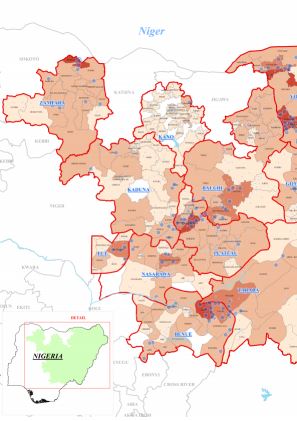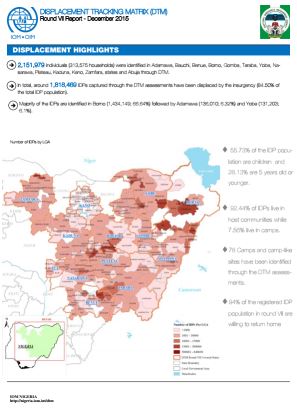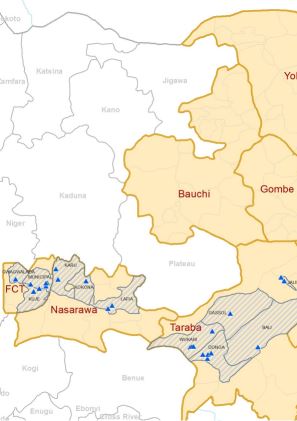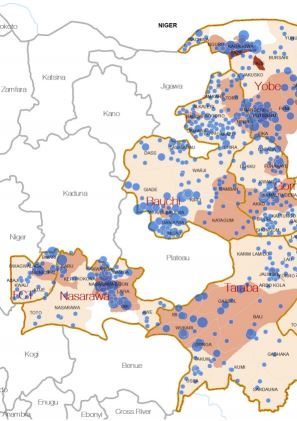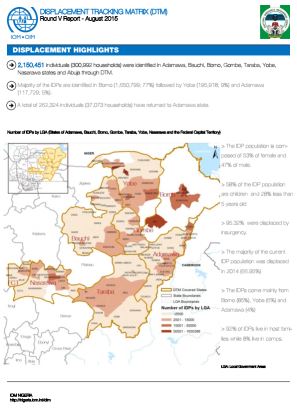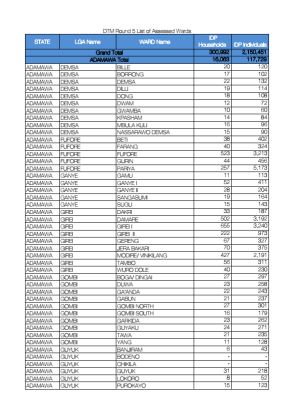-
Countries
-
Data and Analysis
-
Special Focus
-
Crisis Responses
Nigeria
Nigeria
Suivi des PDI
Mouvements de déplacement
3,340,000
IDMC 2023
cycle de collecte de données
À propos Nigeria
The escalation of violence between all parties in north-eastern Nigeria since 2014 has resulted in mass displacement and deprivation in the states of Adamawa, Bauchi, Borno, Gombe, Taraba and Yobe. To better understand the scope of displacement and assess the needs of affected populations, IOM has been implementing its Displacement Tracking Matrix (DTM) programme starting July 2014, in collaboration with the National Emergency Management Agency (NEMA) and State Emergency Management Agencies (SEMAs). The activities of the DTM project, which consist of conducting baseline assessments and registration for IDPs living in camps and host communities, are currently being carried out in Adamawa, Bauchi, Borno, Gombe, Taraba and Yobe.
The information collected will contribute to the provision of a comprehensive profile of the IDP population in Nigeria which will be shared with all relevant stakeholders and will contribute towards enabling the government of Nigeria and humanitarian partners identify the needs of Nigeria's displaced population and develop interventions for providing IDPs necessary assistance.
Contacter
DTM Nigeria
DTMNigeria@iom.int
Bailleurs de fonds
- ECHO
- BHA
- Canada
Nigeria — Kano Site Profiles 8 (1 January — 28 February 2016)
This document contains the site profile for the displacement site identified in Kano state, Nigeria.
Nigeria — Kaduna Site Profiles 8 (1 January — 28 February 2016)
This document contains the site profiles for all displacement sites identified in Kaduna state, Nigeria.
Nigeria — Federal Capital Territory Site Profiles 8 (1 January — 2 February 2016)
This document contains the site profiles for all displacement sites identified in the Federal Capital Territory, Nigeria.
Nigeria — Benue Site Profiles 8 (1 January — 28 February 2016)
This document contains the site profile for the displacement site identified in Benu, Nigeria.
Nigeria — Yobe Site Profiles 8 (1 January — 28 February 2016)
This document contains the site profiles for all displacement sites identified in Yobe state, Nigeria.
Nigeria — Taraba Site Profiles 8 (1 January — 28 February 2016)
This document contains the site profiles for all displacement sites identified in Taraba state, Nigeria.
Nigeria — Borno Site Profiles 8 (1 January — 28 February 2016)
This document contains the site profiles for all displacement sites identified in Borno state, Nigeria.
Nigeria — Adamawa Site Profiles 8 (1 January — 28 February 2016)
This document contains the site profiles for all displacement sites identified in Adamawa state, Nigeria.
Nigeria — List of Wards Assessed 8 (1 January — 28 February 2016)
This document lists all the wards assessed in DTM Round 8 by state, Local Government Area and ward, showing the total number of displaced individuals and households identified.
Nigeria — List of Displacement Sites Assessed 8 (1 January — 28 February 2016)
This document lists all the sites assessed in DTM Round 8 including the site ID, site name, state, Local Government Area, ward name, number of households and number of individuals.
Nigeria — Site Assessment Dashboard 8 (1 January — 28 February 2016)
186,268 IDPs in 34,240 households were identified in 84 displacement sites. 54% of the IDP population are children. The dashboard includes a map showing the location and population of sites by Local Government Area (LGA) assessed.
Nigeria — Displacement Dashboard 8 (1 January — 28 February 2016)
2,241,484 IDPs in 334,608 households were identified in Round 8 assessments from January to February 2016. 55% of the IDP population in the sites are children, 53% are female. The dashboard includes a map of displacement severity by Local Government Area (LGA) and ward.
Nigeria — Displacement Report 8 (1 January — 28 February 2016)
2,241,484 IDPs (334,608 households) were identified in Adamawa, Bauchi, Benue, Borno, Gombe, Taraba, Yobe, Nasarawa, Plateau, Kaduna, Kano, Zamfara states and Abuja. The highest number of IDPs are in Borno (1,525,404 IDPs), followed by Yobe (139,550) and Adawama (132,626 IDPs).
Nigeria — List of Wards Assessed 7 (November — Decemver 2015)
2,151,979 displaced individuals (318,937 households) were identified in Round 7 of DTM in Nigeria.This document provides the list of wards assessed and the numbers of individuals and households identified in each, organised by State and Local Government Area (LGA).
Nigeria — Displacement Dashboard 7 ( November — December 2015)
As of December 2015, 2,151,979 IDPs or 313,575 households were identified in the seventh round of assessments.
Nigeria — Displacement Report 7 (1 November — 31 December 2015)
2,151,979 IDPs (313,575 households) were identified in Adamawa, Bauchi, Benue, Borno, Gombe, Taraba, Yobe, Nasarawa, Plateau, Kaduna, Kano, Zamfara states and Abuja. Borno state (1,434,149 IDPs) has the highest number of IDPs, followed by Adamawa (136,010 IDPs) and Yobe (131,203 IDPs).
Nigeria — List of Wards Assessed 6 (1 Septembre — 31 Octobre 2015)
2,233,506 displaced individuals (318,937 households) were identified in Round 6 of DTM in Nigeria.This document provides the list of wards assessed and the numbers of individuals and households identified in each, organised by State and Local Government Area (LGA). 
Nigeria — Displacement Dashboard 6 (September — October 2015)
As of October 2015, 2,233,506 IDPs in 318,937 households were identified in the sixth round of assessments. The dashboard includes a map of displacement severity by Local Government Area (LGA) and ward.
Nigeria — Displacement Report 6 (1 September — 31 October 2015)
2,233,506 IDPs (318,937 households) were identified in Adamawa, Bauchi, Borno, Gombe, Taraba, Yobe, Nasarawa, Plateau, Kaduna states and Abuja. Borno state (1,606,406 IDPs) has the highest number of IDPs, followed by Yobe (144,302 IDPs) and Adamawa (135,605 IDPs).
Nigeria — Site Assessment Dashboard 6 (October 2015)
This Site Assessment Dashboard identified 189,011 IDPs (28,983 households) in 76 camps and camp-like settings. 52% of the IDPs identified are children and overall, most IDPs are women between 18 and 59 years old.
Nigeria — Site Assessment Dashboard 5 (August 2015)
As of August 2015, this Site Assessment Dashboard identified 2,150,451 IDPs (300,992 households), of which 170,368 IDPs were staying in 59 camps and camp-like settings. Most IDPs were identified in Borno, Adamawa, Abuja and Yobe.
Nigeria — Displacement Dashboard 5 (July — August 2015)
As of August 2015, 2,150,451 IDPs or300,992 households were identified in the fifth round of assessments. Of these, 170,368 IDPs were identified in 59 camps. The dashboard includes a map of displacement severity by Local Government Area (LGA) and ward.
Nigeria — Displacement Report 5 (1 July — 31 August 2015)
2,150,451 IDPs (300,992 households) were identified in Adamawa, Bauchi, Borno, Gombe, Taraba, Yobe, Nasarawa states and Abuja. Borno state (1,650,799 IDPs) has the highest number of IDPs, followed by Yobe (195,918 IDPs) and Adamawa (117,729 IDPs).
Nigeria — List of Wards Assessed 5 (1 July — 30 August 2015)
2,150,451 displaced individuals (300,992 households) were identified in Round 20 DTM in Nigeria.This document provides the list of wards assessed and the numbers of individuals and households identified in each, organised by State and Local Government Area (LGA).
Pagination
Pagination
- First page
- Previous page
- 1
- 2
- 3
- 4
- 5
- 6
- 7
- 8
Pagination
- First page
- Previous page
- 1
- 2
- 3
- 4
- 5
- 6
- 7













